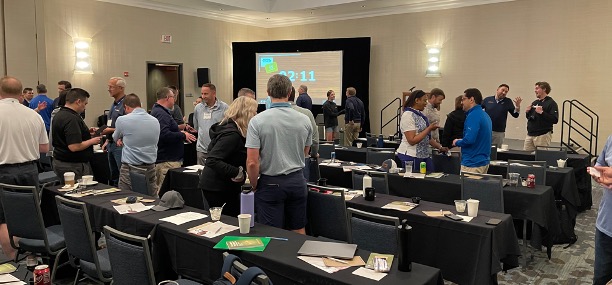In any team, the real test of leadership isn’t crafting a vision or goal.
It’s sustaining the disciplined effort required to make that vision a reality.
Without clear standards and an unflinching commitment to uphold them, teams fall prey to inconsistent performance and unmet potential.
The truth is, teams don’t grow in smooth sailing.
They grow through challenges, adversity, and the unexpected. But how teams respond to these moments of truth often depends on whether their standards are mere suggestions or non-negotiable expectations.
Strong standards don’t just ensure accountability; they also inspire growth, collaboration, and resilience.
So, ask yourself: are your team’s standards driving consistent performance, or are they optional rules that can be ignored without consequence?
This question is important in business – but it’s impact is something I discovered first as a basketball coach.
And there are specific steps you can take to ensure your team’s standards lead to success.
The Power of Clear Standards: Lessons from the Court
Imagine a basketball team that practices hard but loses games due to missed defensive assignments, poorly executed plays, and a lack of communication.
On the surface, it may seem like bad luck or a tough opponent.
But the real issue lies beneath the surface: the team lacks clear, enforced standards.
Take defensive positioning, for example. If the standard is “always be in help position,” but players fail to rotate when a teammate gets beat off the dribble, it’s not just a tactical failure—it’s a failure of accountability.
Similarly, if offensive plays fall apart because screens aren’t set with intention or players freelance instead of running the set, the results will be just as chaotic as the effort.
Championship teams don’t win by talent alone!
Talent IS essential… but never sufficient.
Winning Teammates win by adhering to standards that demand consistency.
When a coach lets lazy habits go unaddressed—whether it’s jogging back on defense or not calling out screens—it sends the message that those behaviors are acceptable.
And as the saying goes, what you permit, you promote.
Great teams clarify their expectations and hold every member accountable. They don’t tolerate half-hearted effort because they know inconsistency in the small things leads to failure in the big moments.

Accountability in Business: Lessons from the Boardroom
The same principle applies in organizations.
Consider a sales team where punctuality and preparation for client meetings are “suggestions.”
Team members might show up late or fail to research a prospective client, leading to blown opportunities. When leaders fail to enforce these standards, they aren’t just letting individuals slide—they’re undermining the team’s collective success.
Compare that to a high-performing organization where every team member knows the standards and the consequences of falling short.
For example, in a marketing firm, a leader might enforce strict deadlines for campaign reviews and demand attention to detail in all client-facing presentations. When one team member misses the mark, the issue isn’t ignored or brushed aside; it’s addressed immediately.
The result?
Higher trust within the team, and—most importantly—consistent results.
Like in basketball, accountability isn’t punitive;
it’s about creating a culture where standards are lived out, not negotiated.
What Leaders Can Do to Inspire Commitment to Standards
So how can you ensure that your team standards and agreements are seen as non-negotiable commitments?
How do get your team standards to consistently be upheld?
Here are FIVE practical steps to take:
- Clarify the Standards. Vague expectations lead to vague results. Define clear, behavior-based standards for what success looks like, whether that’s making the extra pass on the court or submitting error-free reports in the office.
- Model the Commitment. Leaders set the tone. If you cut corners or fail to address lapses in standards, don’t expect your team to step up. Be the example of discipline and accountability you want to see.
- Give Immediate Feedback. When someone falls short, address it right away. A basketball coach wouldn’t wait until after the game to call out poor shot selection—and a manager shouldn’t wait until quarterly reviews to address performance gaps.
- Encourage Peer Accountability. Great teams don’t just rely on the coach or manager to enforce standards. They empower teammates to hold each other accountable, creating a shared sense of ownership and pride.
- Celebrate the Standard Bearers. Reward team members who consistently meet or exceed expectations. Recognition reinforces positive behavior and motivates others to follow suit.

The Benefits of Adversity – and Accountability
Here’s the irony: while enforcing high standards can feel uncomfortable, it’s often adversity that forges the strongest teams.
When players or employees face a crisis—whether it’s a tough playoff opponent or a high-pressure client deadline—it forces them to confront their weaknesses and work together to overcome them.
These moments aren’t just tests; they’re opportunities.
They teach problem-solving skills, foster collaboration, and build a sense of pride in overcoming challenges. A basketball team that rallies after losing three games in a row doesn’t just improve its record—it strengthens its identity. A business unit that solves a crisis together doesn’t just hit its targets—it solidifies its culture.
Ultimately, teams that thrive in the face of adversity do so because their standards are clear and agreed upon. They’re not suggestions or platitudes—they’re commitments.
If your team’s standards are clear but inconsistently enforced, don’t be surprised if the results mirror the effort. But if you’re willing to demand disciplined effort and foster accountability, you’ll create a culture that not only meets expectations but exceeds them.
If you want to learn how to clarify expectations and build a culture of accountability that drives collaboration, consistency, and results, contact me, Sean Glaze.
As an experienced and interactive speaker and facilitator, I can help make your next professional development day a memorable and impactful success for your team.
Let’s talk about how to take your teamwork to the next level.
– – – – –

Sean Glaze is a leadership speaker, teambuilding facilitator, and author who delivers engaging experiences that ignite your team’s performance. Sean has worked with clients like Cisco, John Deere, the CDC, and Emory University to increase collaboration, boost productivity, and build more positive and profitable workplace cultures.
As a successful basketball coach, Sean gained valuable insights on turning talent into teamwork – and now he travels around the country to share those lessons. Sean’s conference keynotes and custom team building events deliver laugh-out-loud moments and memorable take-aways that transform your people into winning teammates and more effective leaders.
Sean’s books, Rapid Teamwork, The 10 Commandments of Winning Teammates, and Staying Coachable are entertaining parables that help accelerate the growth of leaders and their teams!

Use Connection Chats to Engineer Better Collaboration Across Every Division on Your Team

Effective Leaders Build Trust and Teamwork by Focusing on Leadership Development

The Power of a Sticky Culture in Boosting Organizational Performance and Retention

The Difference Between Being Trust-Willing and Trustworthy in Boosting Team Performance
Books and Resources for Leaders
Check other blog
Use Connection Chats to Engineer Better Collaboration Across Every Division on Your Team
Effective Leaders Build Trust and Teamwork by Focusing on Leadership Development
The Power of a Sticky Culture in Boosting Organizational Performance and Retention
Contact Sean

Connect with Sean

Tell Sean About
Your Event
Tell Sean About
Your Event
"*" indicates required fields











